The Pomeroy Banker
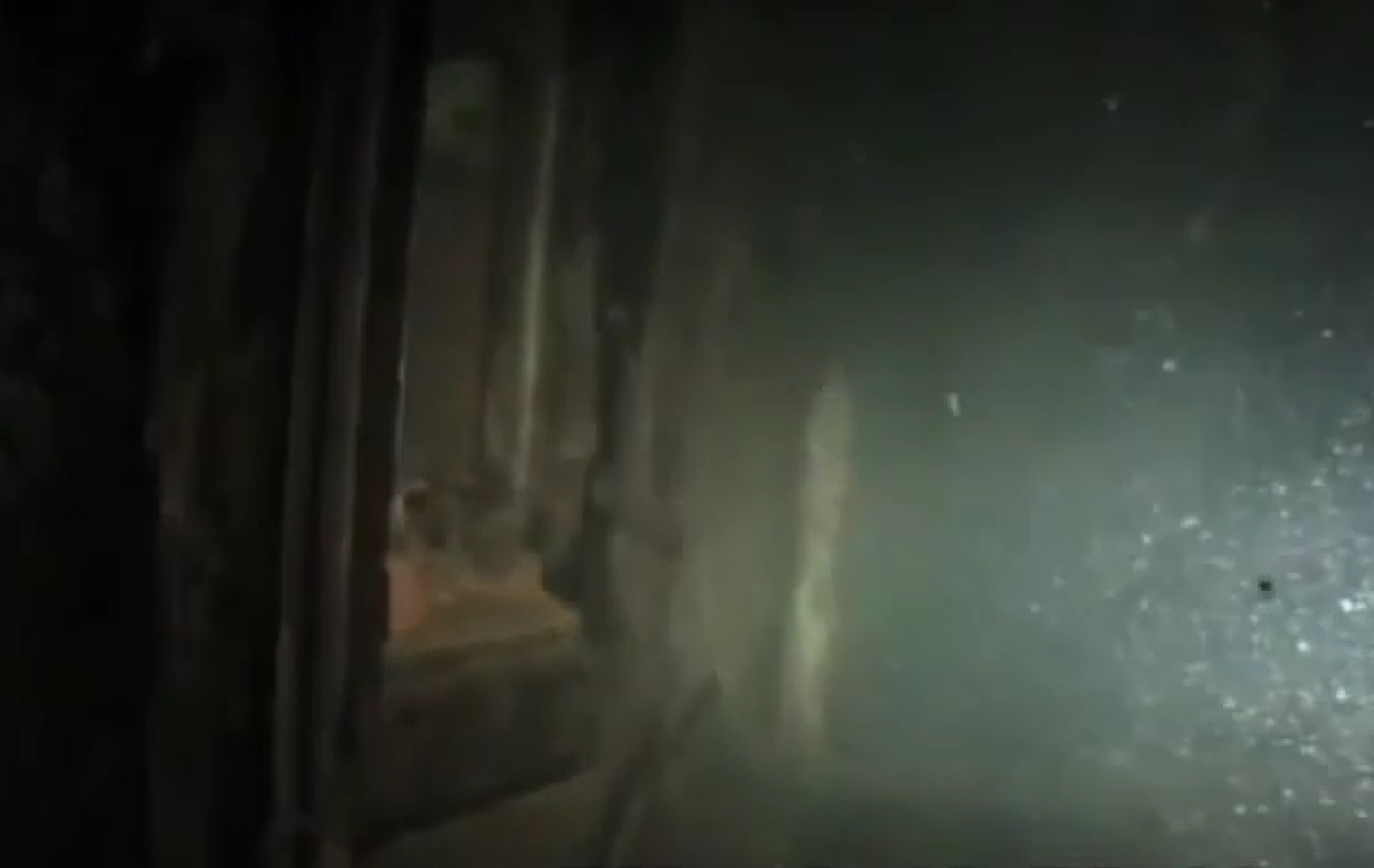
Image credit: Earthship Productions
In 2005, a remotely operated vehicle (ROV) driven by filmmaker and explorer James Cameron shined its lights around an eerie, dark area of A-Deck on the Titanic. What used to be cabin after cabin for her 1st class passengers were now a tangled mess of wires, remnants of walls, bases of wardrobes, and dressers with mirrors shining through the dark abyss when the lights from the ROV shone on them. Brass beds and heaters still stood out of the silt. Briefly, cabin A-21 which belonged to one of Titanic’s lesser-known passengers, John Bertram Brady, was illuminated with its windows facing the A-Deck Promenade where passengers once strolled becoming visible.
John Bertram “Bert” Brady was born on December 3, 1870 to John Brady and Emily Rose Campbell in Satsop, Washington. His parents were descended from Irish immigrants who came to America in the early 1800s. His father John was born in New York and came to California with his parents. He settled in Satsop, WA in 1853 where he met and married Emily Rose Campbell Wagstaff on December 10, 1867, a widow whose Civil War veteran husband passed away in 1863. Emily was born in Ohio and lived for years in Kansas with her daughter Myrtle. Together, John and Emily, had three children with Elmer being the first born in 1868, followed by Bert in 1870, and finally Ella came in 1878. In July 1879, the family came to an area of Garfield County which later came to be known as Pomeroy, WA. Pomeroy was a very small town which was incorporated in 1886 after the family had been living there for a while. As the Brady children grew up, the town was in its infancy and the family became known as one of the pioneering families of the area. Bert was educated in the public school in Pomeroy and then when his family moved to Portland, Oregon for a time, he attended Bishop Scott’s Academy of Portland. His father was a business owner who co-owned ran the Brady and Eisensohn general merchandise store in Pomeroy which he continued to own after they moved to Portland and San Jose. They also owned a block of land where they had an orchard of grapes and other kinds of fruit. As Bert became an adult, he moved back to Pomeroy and took over part-ownership of the store. He also played as 3rd baseman for the town’s baseball team when he was 20. The rest of his family continued to reside in Portland and eventually moved to San Jose, California in the meantime. Bert first made his mark on Pomeroy when he opened the Pomeroy Improvement Co. when he was just 25, which was created to promote milling, manufacturing, building, and the general welfare of the town. Despite his younger age, Bert was able to help many people in the town and their businesses through this venture. On July 18, 1900, a fire destroyed nearly all of downtown Pomeroy including the mercantile store leaving only a shell of the building. Bert assisted with rebuilding the town and the store. In 1901, he became a stockholder when the Pomeroy Savings Bank was founded along with his family which included his father, brother-in-law Robert Lee Rush (who was married to his half-sister Myrtle in 1882), and his sister Ella.
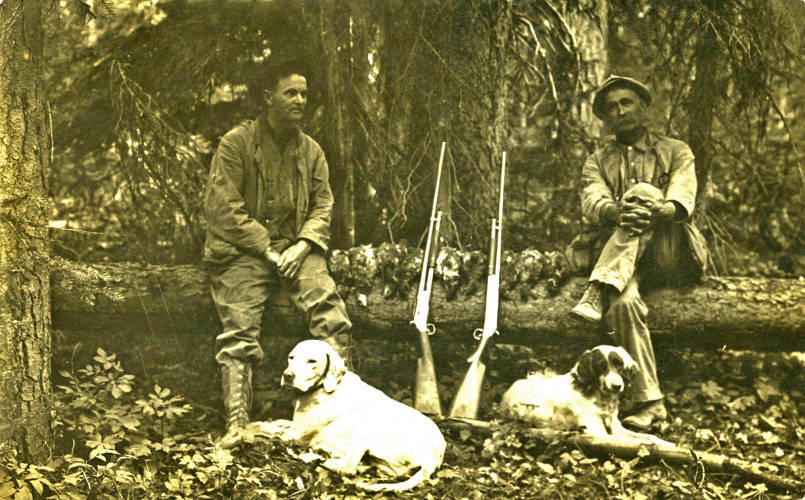
John Bertram Brady and Otto Long hunting
Image credit: Denny Ashby Library/Washington Rural Heritage
https://www.washingtonruralheritage.org/digital/collection/pomeroy/id/847/rec/4
Bert’s father John had some poor health in 1904 which concerned his family. I unfortunately don’t have a record of what he suffered from, but the family did what they could to care for him while they were going between San Jose and Pomeroy. Bert’s 1904 letter to his love interest Bertha indicated that John had some good days and not good days. He appeared to get better at one point, but then he started to decline. Bert’s letter dated August 5, 1905 said he was starting to get very sick again. On November 11, 1905, his father died in San Jose and was buried at Oak Hill Memorial Park. Bert (who was executor of his father’s estate) traveled down to be with his family and help his mother and sister as they mourned. On April 18, 1906, the great San Francisco Earthquake heavily damaged Bert’s family home in San Jose. His mother had her hand smashed and his sister Ella had been thrown around. The tremors reportedly caused the chimney to topple, doors to be thrown off hinges, and windows to be broken. Bert returned to San Jose to help his family through it when he got word of what happened. That same year, he sold his stake in his father’s store to his business partner Fred Eisensohn in order to become Vice President of Pomeroy Savings Bank with Robert Rush as President of the bank. In addition, Bert also invested in the Weller Livestock Company and owned ⅓ share of the company. Bert was not among the top 1% of the wealthiest men in America, but he was doing well for himself and was one of the more successful men in Pomeroy. Given the fact he was a successful man who held positions of trust and leadership in business and the fact he was a Freemason, Bert was also a popular man in Pomeroy, having many friends and acquaintances. His continued letters to Bertha give the impression that he was an easy-going, friendly, observant, and smart person who loved to travel. His letters also indicate that hunting and fishing were among his favorite hobbies. In nearby Spokane, he was a member of the El Katif Temple for Shriners and a member of the Commandery in Walla Walla.
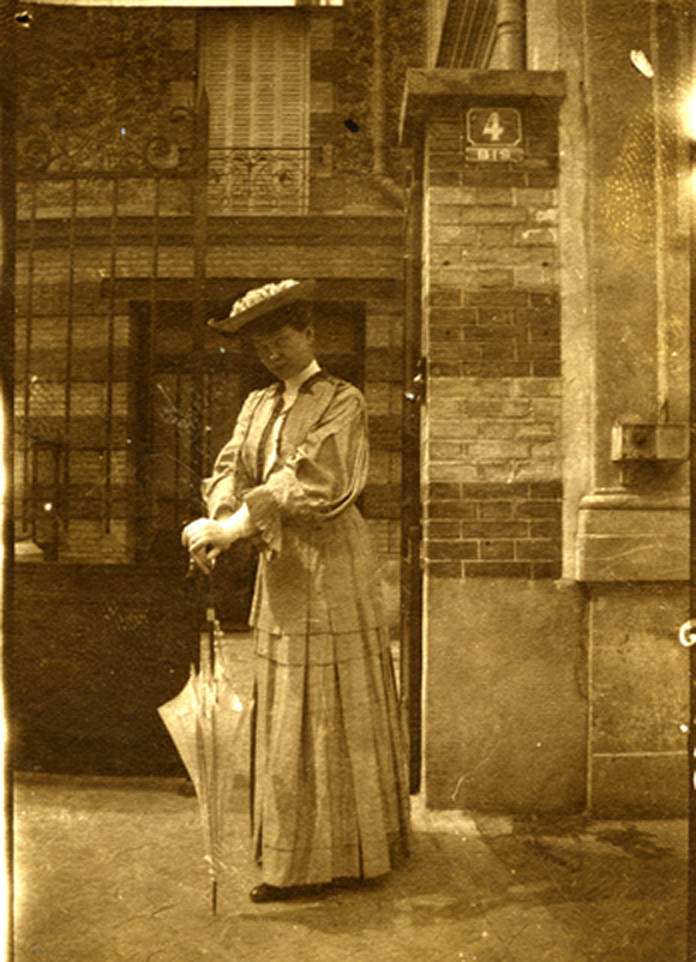
Bertha Houser circa 1903 from the Denny Ashby Library/Washington Rural Heritage https://www.washingtonruralheritage.org/digital/collection/pomeroy/id/1013/rec/27
Bert was in a long-term relationship with a young woman named Bertha Houser. The Houser family was also prominent in Garfield County. Bertha’s father John was a German immigrant who had quite a life surviving a deadly attack on his wagon train by Native Americans and being one of the first people to produce flour and farina in the United States. They were early pioneers of the city of Colville, arriving in 1866. They later moved down to Pomeroy where they became prominent citizens and business-owners. Bertha was an artistic person who loved to travel and paint. She combined those two loves by studying art in Paris and visiting there often. It seems to have started as a platonic friendship while she was studying in Paris. One of the earliest known letters from Bert to Bertha in 1903 mentions how he was looking for good-looking women and she was looking for good-looking men. However, they had a close friendship to the point that he mentioned in a letter from that same year that he would miss Bertha while she was gone to Europe and he remained a close friend of the Houser family. He would write to her about visiting her family and doting on her young niece Frances. While Bertha was in Europe, Bert sent letters encouraging her and giving her advice on traveling and visiting cities he’d been to. Their friendship did lead to a romantic relationship, but it was an interesting one. They both traveled a lot and would be apart for months, but did update each other about what they were doing and seeing through their letters. On October 12, 1910, Bert’s mother Emily passed away. She had been cared for by her family since her husband passed away and she was buried with John Brady in Oak Hill Cemetery in San Jose, CA. The occasion likely influenced Bert’s decision to revise his will for what would be the final time on November 21, 1910.
In December 1911, Bert renewed his passport while he was planning a European holiday in early 1912 with his sister Ella. His application describes him as 5’ 9 ½” tall, eyes gray, and hair as gray. While he was on holiday, he wrote multiple letters back home to keep in contact with his friends in Pomeroy. Houser family lore says that while Bert was in Europe, he asked Bertha’s great-aunt, the Houser family matriarch, for her blessing for Bertha’s hand in marriage. Unfortunately, his writings do not confirm this story. In Europe, a coal strike caused a shortage of coal which was canceling Atlantic crossings left and right and caused Bert to be concerned about getting home. He wrote to his good friend William B. Morris and said:
“I am booked to sail on the new steamer Titanic, first trip across. But it’s such a thing, she can’t go on account of the coal strike. May not get coal so I am going over to the German boats today and book passage in them for the same date. They will have coal, so if I don’t get off on the Titanic I’ll go off on the other.”
Unfortunately, Bert did not have to go with his contingency plan. Bert visited Rome, Naples, London, Cork, Dublin, Belfast, and Edinburgh before heading back down to London and Southampton. His letters speak of how he enjoyed his trip and his excitement about sailing on the new Titanic. He parted ways with Ella on his first visit to London and continued alone to Ireland and Scotland while Ella stayed with friends. While he was in Belfast, he stayed in the Grand Central Hotel where coincidentally, a luncheon was held almost a year prior to celebrate the Titanic’s launch. From there, he wrote a letter to Fred Mathies on March 30 which said:
Friend Fred,
Where are those letters you were going to write? Have only seen one. But I guess you are too busy. I am over amongst friends. You bet they are all right. I like it over here. One can have a good time over here. I took Cork and Dublin in and I will go from here over into Scotland, and then back to London. I ought to be back in the US soon. If all goes well I ought to be in New York about April 18. One can’t tell anything about travel over here. Coal strikes are tying everything up. I might get stuck getting back to London. But I am going to see it while I’m here. I am so stuck on Ireland-I guess because they are my kind. I left my sister in London. I will have seen enough for this time. By then I can’t get home too soon. I will stop over in New York for a few days and then go straight to Pomeroy. I am a little tired of travel, but as soon as I get rested I will be ready to go again. Hoping this finds everything fine, I am.
Yours truly,
J.B. Brady
Bert’s last known letter home before boarding the Titanic was sent from Edinburgh, Scotland on April 3, 1912. It was sent to J.R. Macmaster with a picture of a place where Macmaster used to work. It said:
I am enjoying Scotland, and I have to think of my Scotch friends.
Best wishes to all,
J.B. Brady
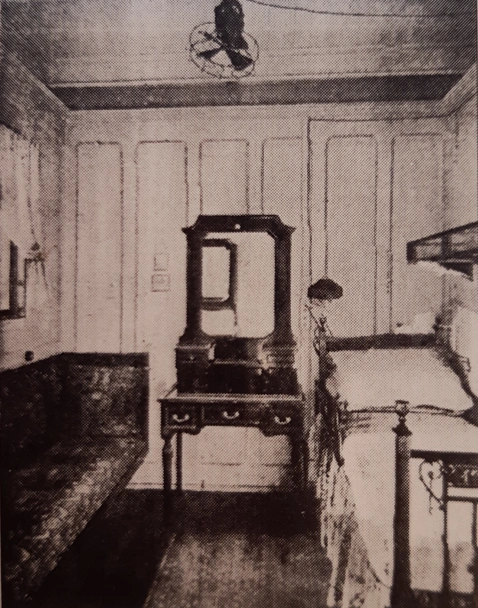
Image Credit: https://titanic.fandom.com/wiki/Cabin_A-21
On April 10, 1912, Bert boarded the Titanic at Southampton as a 1st class passenger. Bertha’s brother Max Houser was supposed to be on the ship as well, but canceled for an unknown reason. Bert’s cabin was A-21, located forward of the famous Grand Staircase. His cabin was one of the standard single berth cabins which was plainer than what most would expect because the more luxurious cabins were more expensive, but they also had simpler 1st class cabins which could be booked at cheaper rates. His cabin had white paneled walls, a twin bed, dresser, and a sofa. The cabin also had a large rectangular window which looked out on the Promenade Deck and allowed a lot of natural light in and curtains for privacy. After boarding the Titanic, we sadly do not have any accounts of his actions or words on the ship. On April 15, 1912, word reached the Brady and Houser families that the Titanic had gone down. Max Houser was in England at the time. When word reached him, he went to the White Star offices to get updates about Bert. He sent a telegram to Bert’s half-sister Myrtle and brother-in-law Robert Rush saying that the Titanic had gone down, but all passengers were safe, which was what the newspapers were reporting at the time. A second telegram was sent later that day saying that he suspected it may be worse than what they are reporting. The next day at 3:30 AM Pacific Time, a 3rd telegram was sent by Max saying that few men were saved. Word later reached them that Bert was gone without a doubt. His absence on the rescue ship Carpathia which docked April 18th only further confirmed that he was lost in the disaster. His body, if recovered by one of the ships searching for victims, was never identified. He was only 41 years old.
Ella, Elmer, and other family and friends returned home to be with the Brady family and their loved ones. Max Houser took the SS George Washington which took a more southerly route to avoid icebergs in order to get back to America due to the Titanic disaster after the wireless operator of the SS George Washington had sent ice warnings to the Titanic on the previous voyage. Cards and letters came pouring into the family from those who knew and liked Bert. Newspaper articles reported on his life, impact, and final letters to people while he was in Europe. The whole community of Pomeroy mourned his loss. Businesses closed for an hour between 11:00 and 12:00 in Pomeroy and the bank closed all day in his honor. The Pomeroy Commercial Club of which Bert was a member held a public memorial and memorial services were held on April 28th. Bert’s friends, many of whom received letters from Bert during his travels in Europe, led the services. John Bertram Brady’s estate was valued at $40,000 which would be $1,297,072.16 today. He left certain amounts of money to Myrtle, Elmer, and his friend William B. Morris. He left most of it to his sister Ella. Elmer was a Yale graduate, lawyer, judge, and commissioner who was a loved member of the family, but not as involved in the business due to his career path. Ella married Joseph Bond Tucker on February 10, 1915. They lived in Portland, but continued to stay involved in the businesses of Pomeroy like her brother. Ella never got over his death and when she passed away on January 6, 1943, a cenotaph for him was included on her headstone at Oak Hill Memorial Park in San Jose, California near their parents. Bertha Houser continued to paint and travel the rest of her life and never married. Her travels took her to different parts of America, Mexico, Canda, and Europe. At one point in 1914, she was arrested by the French on suspicions of being a German spy when she and her friend painted French fortifications as tensions were heightened during the beginning of WWI. Thankfully, their names were cleared. She had a stroke in the mid-1930s which left her face disfigured, but she did not stop traveling. She passed away on June 10, 1948 and was buried in Pomeroy. John Bertram Brady is sadly a forgotten passenger of the Titanic largely because he doesn't feature in the moving survivors' accounts and he wasn't one of the elite passengers, but he led a very full life which ought to be honored and remembered. He was a generous kind person who helped many people in his community and was a friend to many.
A special thanks to Muriel Bott for her help and encouragement
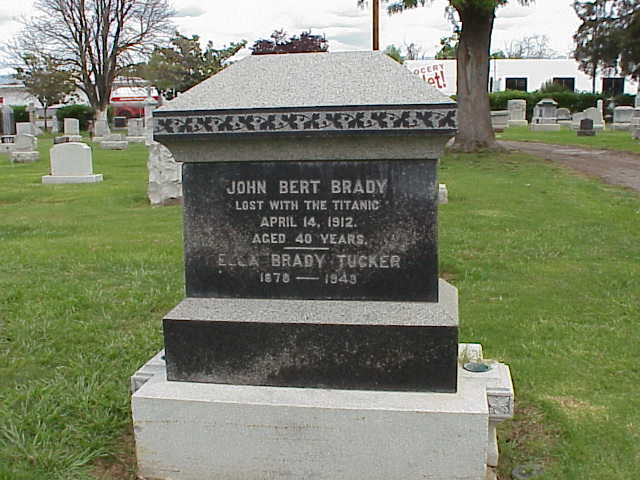
Image credit: Find a Grave, database and images (https://www.findagrave.com/memorial/10931449/john_bertram-brady: accessed August 26, 2024), memorial page for John Bertram “Bert” Brady (3 Dec 1870–15 Apr 1912), Find a Grave Memorial ID 10931449, citing Oak Hill Memorial Park, San Jose, Santa Clara County, California, USA; Maintained by Debbie (contributor 46570228).
Resources:
Washington Rural Heritage/Denny Ashby Library “Mourn Death of J.B. Brady, Pomeroy, Washington, 1912” article from unidentified newspaper
Washington Rural Heritage Archive/Denny Ashby Library-Noted pioneer miller is dead, The Inland Herald, Patah, Washington, May 1, 1911
Washington Rural Heritage Archive/Denny Ashby Library letters from John Bertram Brady to Bertha Houser dated June 4, 1903, December 14, 1904, August 15, 1905, August 23, 1905,
Washington Rural Heritage/Denny Ashby Library letter from Mrs. Melton to Emma Houser April 18, 1912
Unidentified newspaper published April 9, 1981
1880 United States Federal Census
The Inland Herald May 1, 1911
National Archives and Records Administration (NARA); Washington D.C.; Roll #: 150; Volume #: Roll 0150 - Certificates: 63908-64807, 15 Dec 1911-06 Jan 1912